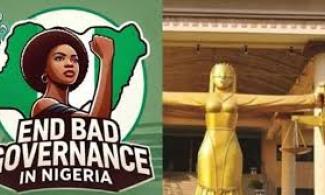A Senior Magistrate Court in Kano State, presided over by Ibrahim Abubakar Mansur, has dismissed the First Information Report (FIR) against 37 protesters who were arrested during the #EndBadGovernance demonstrations in 2020. The court’s decision marks a significant step towards upholding the fundamental rights of citizens to peaceful protest.
The 37 protesters were arrested in Kano State on October 10, 2020, during peaceful demonstrations against police brutality and government corruption. They were charged with various offenses, including inciting public disturbance and unlawful assembly.
In his ruling, Magistrate Mansur stated that the prosecution had failed to present sufficient evidence to substantiate the charges against the protesters. The court found that the evidence presented was circumstantial and did not meet the legal threshold required for a conviction.
The magistrate emphasized the importance of freedom of expression and the right to peaceful assembly. He stated that citizens have the right to express their grievances and demand accountability from their government, as long as their actions do not pose a threat to public safety or order.
The dismissal of the charges against the #EndBadGovernance protesters is a significant victory for human rights activists and civil society organizations in Nigeria. It sends a clear message that the government cannot suppress dissent or punish citizens for exercising their fundamental rights.

The case has also drawn attention to the ongoing challenges faced by human rights defenders in Nigeria. Despite the progress made in recent years, there are still concerns about the government’s commitment to upholding the rule of law and protecting human rights.
The #EndBadGovernance Movement
The #EndBadGovernance movement emerged in Nigeria in 2020 in response to widespread concerns about police brutality, corruption, and government inefficiency. The movement gained momentum following the killing of a young man named George Floyd by police officers in the United States.
Protesters across Nigeria took to the streets to demand an end to police brutality, accountability for perpetrators, and reforms to the security forces. The movement also highlighted broader issues of governance, including corruption, inequality, and lack of opportunities for young people.
Despite the peaceful nature of the #EndBadGovernance protests, many protesters faced harassment, intimidation, and arrest. Some were even killed or injured during clashes with security forces.
The government’s response to the protests was mixed. While some officials expressed support for the demands of the protesters, others took a more repressive approach. The arrest of the 37 protesters in Kano State was part of a broader crackdown on dissent.
The dismissal of the charges against the #EndBadGovernance protesters is a positive development, but it does not mean that the challenges facing human rights defenders in Nigeria have been completely resolved.
The government must continue to uphold the rule of law and protect the fundamental rights of its citizens. Civil society organizations must also remain vigilant and advocate for justice and accountability.
The #EndBadGovernance movement has raised important issues about governance, security, and human rights in Nigeria. It is essential that the government and civil society organizations work together to address these challenges and build a more just and equitable society.
The dismissal of the charges against the #EndBadGovernance protesters is a significant victory for freedom of expression and the rule of law in Nigeria. It sends a clear message that the government cannot suppress dissent or punish citizens for exercising their fundamental rights.
While this is a positive development, it is important to remain vigilant and continue to advocate for justice and accountability. The challenges facing human rights defenders in Nigeria are complex and multifaceted, and it will take sustained effort to address them.
By upholding the rule of law, protecting human rights, and promoting good governance, Nigeria can build a more just and equitable society for all its citizens.



